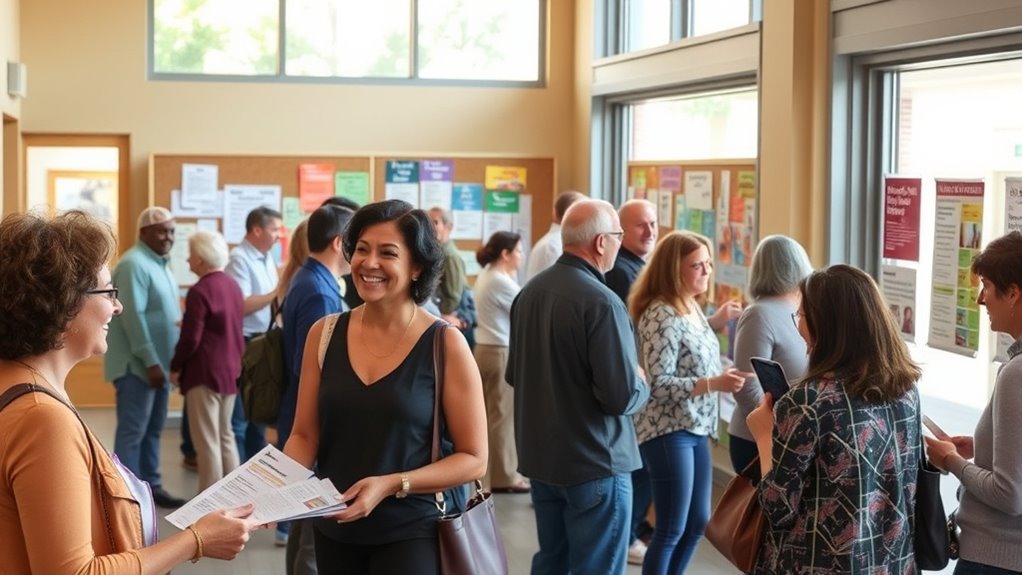To navigate community resources and support groups, start by researching local services online or visiting community centers and clinics nearby. Reach out to social workers or outreach coordinators who can guide you to available mental health services, financial aid, or support groups for issues like grief or addiction. Technology also offers new tools for self-help and therapy, making support more accessible. Keep exploring these options, as there’s plenty more to help you find the support you need.
Key Takeaways
- Research local community programs online or through community centers to identify available resources and support groups.
- Seek guidance from social workers or outreach coordinators for personalized assistance and navigation tips.
- Visit community centers, libraries, or clinics to gather printed materials and ask questions about support options.
- Use dedicated websites or apps that list local social services, including mental health and support groups.
- Take proactive steps to connect with resources despite hesitation, recognizing their role in improving well-being.

Are you aware of the valuable community resources and support groups available to help you navigate life’s challenges? Whether you’re dealing with stress, mental health concerns, or just feeling overwhelmed, knowing where to turn can make a significant difference. Community resources are designed to provide assistance, guidance, and a sense of connection, all essential for maintaining your well-being. Social services, in particular, play an indispensable role by offering a broad range of support, from mental health counseling to financial aid, housing assistance, and more. Recognizing these options helps you take proactive steps toward improving your situation and finding the help you need.
Many communities have mental health services that are accessible and tailored to meet diverse needs. These services can include therapy, crisis intervention, support groups, and educational programs. If you’re struggling with anxiety, depression, or other mental health issues, local clinics or nonprofit organizations often offer sliding-scale fees or free resources. Reaching out to mental health professionals through these social services ensures you don’t have to face your struggles alone. Support groups, in particular, serve as a safe space where you can share experiences, gain insights, and find encouragement from others who understand what you’re going through. These groups often focus on specific issues like grief, addiction, or mental health challenges, making their support particularly relevant.
Accessible mental health services and support groups tailored to diverse needs offer vital relief and encouragement.
To access these resources, start by researching what’s available in your area. Many counties and cities have dedicated websites listing local social services and community programs. You can also visit community centers, libraries, or health clinics for information. Don’t hesitate to ask questions or seek guidance from social workers or outreach coordinators—they’re there to help connect you with the right resources. Remember, taking that initial step can be intimidating, but it’s fundamental for building a support network that can help you through tough times. Additionally, advancements in AI technology are increasingly being incorporated into mental health support, providing innovative tools for self-help and therapy.
Engaging with community resources and support groups not only addresses immediate needs but also fosters resilience and a sense of belonging. Participating in mental health programs or social services can empower you to develop coping skills, improve your overall health, and create a more stable foundation for the future. The key is to stay proactive, seek out help early, and utilize the available tools designed to support your mental health and well-being. By doing so, you’re taking control of your journey and guaranteeing you don’t have to face life’s challenges alone.
Frequently Asked Questions
How Do I Find Local Support Groups for Specific Health Conditions?
To find local support groups for your health condition, start by checking health condition directories online, which list groups in your area. You can also ask your local healthcare providers for recommendations, as they often know about community resources. Additionally, visit hospital websites or community centers for information on support groups. These steps help you connect with others and access the support you need to manage your health condition effectively.
Are Community Resources Available for Non-English Speakers?
Yes, community resources often accommodate non-English speakers by offering translation services and multilingual support. You can find these resources through local healthcare centers, community organizations, or online directories. Don’t hesitate to ask about language assistance when you contact these services. Many groups understand language barriers and work to guarantee everyone can access the support they need. Using translation services helps bridge communication gaps effectively.
What Is the Process to Join a Community Support Group?
You might feel uncertain about how to join a community support group, but there’s an exciting path ahead. First, find local groups through community centers or online platforms. You could discover volunteering opportunities or peer mentorship programs that match your needs. Reach out, attend a meeting, and introduce yourself. As you get involved, you’ll realize how connecting with others can transform your journey and open doors to invaluable support and friendship.
Are There Online Support Groups Accessible From Anywhere?
Yes, you can access online support groups from anywhere through virtual meetings and online forums. These platforms connect you with others facing similar challenges, offering a sense of community and understanding. You simply need to find a reputable group, register or join their online forums, and participate in scheduled virtual meetings or discussions. This flexibility allows you to seek support conveniently, no matter where you’re located.
How Do I Know if a Community Resource Is Reputable?
To determine if a community resource is reputable, start with credibility assessment by checking reviews, official websites, and certifications. Look for transparent contact information and consistent, professional communication. You should also verify the resource through trusted sources like local government or healthcare providers. Doing thorough resource verification helps make sure you’re relying on trustworthy organizations that genuinely support your needs and provide accurate, helpful information.
Conclusion
By knowing where to find community resources and support groups, you’re never truly alone in your journey. These connections can be your lifeline, offering guidance, comfort, and strength when you need it most. Remember, sometimes you have to lean on others to weather the storm. Keep an open mind and don’t hesitate to reach out — you might just find that the help you need is closer than you think.









